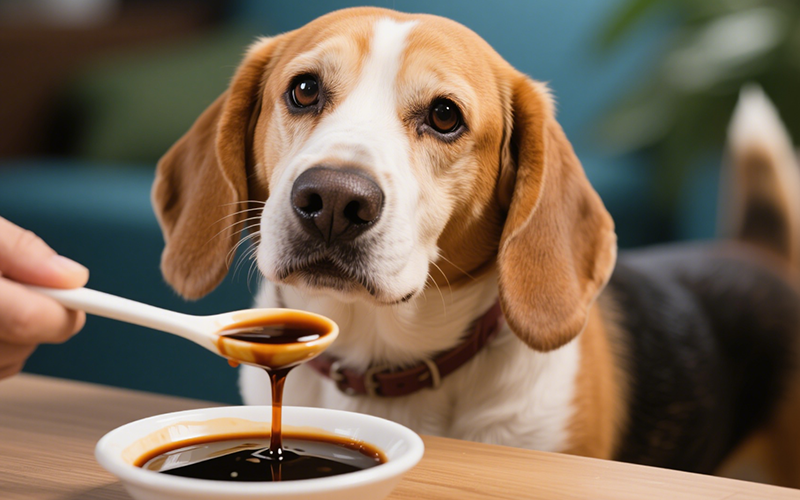Can Dogs Eat Soy Sauce? Here's What You Need to Know
- 9 Apr 2025 14:45
Soy sauce is a staple in many human dishes, adding flavor and saltiness to meals. But when it comes to dogs, is soy sauce safe? The short answer is: no, soy sauce is not recommended for dogs.

Why Dogs Should Avoid Soy Sauce 🚫
High in Sodium 🧂
Soy sauce is extremely high in sodium. Just a small amount can contain an alarming amount of salt, and dogs are much more sensitive to sodium than humans. Excessive salt intake can lead to salt poisoning in dogs, which can cause symptoms like vomiting, diarrhea, tremors, seizures, and excessive thirst. Long-term, high salt consumption can strain your dog’s kidneys and increase the risk of heart disease.Toxic Ingredients (like Xylitol in Some Brands) 🚨
Some soy sauces or marinades may contain xylitol (a sugar substitute that is toxic to dogs). Xylitol can cause a dangerous drop in blood sugar, leading to symptoms like weakness, seizures, and even liver failure. While most soy sauces don’t contain xylitol, it’s always important to check the ingredients.Additives and Preservatives 🛑
Soy sauce often contains additives and preservatives like MSG (monosodium glutamate) and artificial flavorings, which can cause digestive issues and allergic reactions in some dogs. These additives are not ideal for your dog’s health and can contribute to upset stomachs or long-term health problems.Fermentation Byproducts 🧪
The fermentation process used to create soy sauce can introduce various chemicals that might not sit well with your dog’s digestive system, especially if consumed in excess. Some dogs may have more sensitive stomachs that react to these compounds.
What Happens If a Dog Eats Soy Sauce? 🚑
If your dog accidentally eats a small amount of soy sauce, they might experience mild symptoms such as upset stomach or excessive thirst due to the high salt content. However, if they consume a larger amount, they could face more severe symptoms like vomiting, diarrhea, lethargy, and muscle tremors. Salt poisoning is a serious condition, and it’s important to act quickly if you think your dog has consumed too much.
What Should You Do If Your Dog Eats Soy Sauce? 👀
Observe for Symptoms 🤔
If your dog only ate a small amount of soy sauce, monitor them closely for signs of upset stomach or excessive thirst. If they show any symptoms of salt poisoning or vomiting, seek immediate veterinary attention.Contact a Professional 📞
If your dog consumes a large amount of soy sauce or begins to show signs of distress, contact your pet health service immediately. Salt poisoning can be life-threatening if not treated promptly.
Healthier Alternatives to Soy Sauce for Dogs 🦴
If you're looking to flavor your dog's food or give them a special treat, there are plenty of healthier alternatives to soy sauce:
Low-Sodium Broth 🍲
Low-sodium chicken or beef broth can be a safe and flavorful addition to your dog's food. It adds moisture and flavor without the high sodium content of soy sauce.Bran and Oats 🌾
For a savory treat, you can mix in oats or bran with some water to make a nutritious and tasty meal for your dog. These are safe, easy-to-digest ingredients that add a bit of flavor without harmful additives.Homemade Dog Sauces 🍅
Consider making a dog-friendly sauce by mixing unsalted tomato paste with broth and other dog-safe seasonings like turmeric. Always check with your pet health professional if you’re unsure about ingredients.Plain Chicken or Turkey 🍗
Adding a small amount of plain, cooked chicken or turkey to your dog’s food can provide extra protein and flavor without the added risks of soy sauce. Just make sure the meat is free from salt, spices, or bones.
How PettureX Can Help 🧠
If you ever have doubts about what foods are safe for your dog or if you're unsure how to deal with accidental ingestion of harmful substances like soy sauce, PettureX is here to help! With 24/7 online consultations and pet image recognition, PettureX can offer real-time advice on what to do to keep your dog healthy and safe.
Conclusion: Can Dogs Eat Soy Sauce? ✅
No, soy sauce is not safe for dogs. Its high sodium content, preservatives, and potential for toxic ingredients make it a poor choice for your dog’s health. It’s important to avoid adding soy sauce to your dog’s meals and stick to healthier, dog-friendly alternatives like low-sodium broth or plain meat.
If you ever need personalized guidance on your dog’s diet, PettureX is ready to provide the advice you need to keep your pup happy and healthy.
Need help with your dog’s health? Try PettureX for expert advice anytime! 🐶💚
Related

Can Dogs Eat Peaches? Vet Explains Benefits, Cyanide Risks & Safe Serving
- 16 Apr 2025
Can Dogs Eat Mulberries? Vet Explains Safety, Benefits & Potential Risks
- 16 Apr 2025
Can Dogs Eat Mozzarella? Vet Explains the Cheesy Truth (Risks & Benefits)
- 16 Apr 2025
Can Dogs Eat Maple Syrup? The Sugary Truth & Why Vets Advise Against It
- 16 Apr 2025
Can Dogs Eat Mango Skin? Vet Explains Why It's a Risky Chew!
- 16 Apr 2025
Can Dogs Eat Mac n Cheese? Vet Explains Why This Comfort Food Is Unsafe!
- 16 Apr 2025
Can Dogs Eat Liver? Vet Guide to This Nutrient-Dense Organ Meat (Benefits & Risks!)
- 16 Apr 2025
Can Dogs Eat Lamb? Vet Insights on This Nutritious Meat Option
- 16 Apr 2025
Can Dogs Eat Licorice? The Sweet Danger & Glycyrrhizin Risk Explained by Vets
- 16 Apr 2025
Can Dogs Eat Jelly? The Sweet Truth About Sugar, Xylitol & Why Vets Say No!
- 16 Apr 2025
